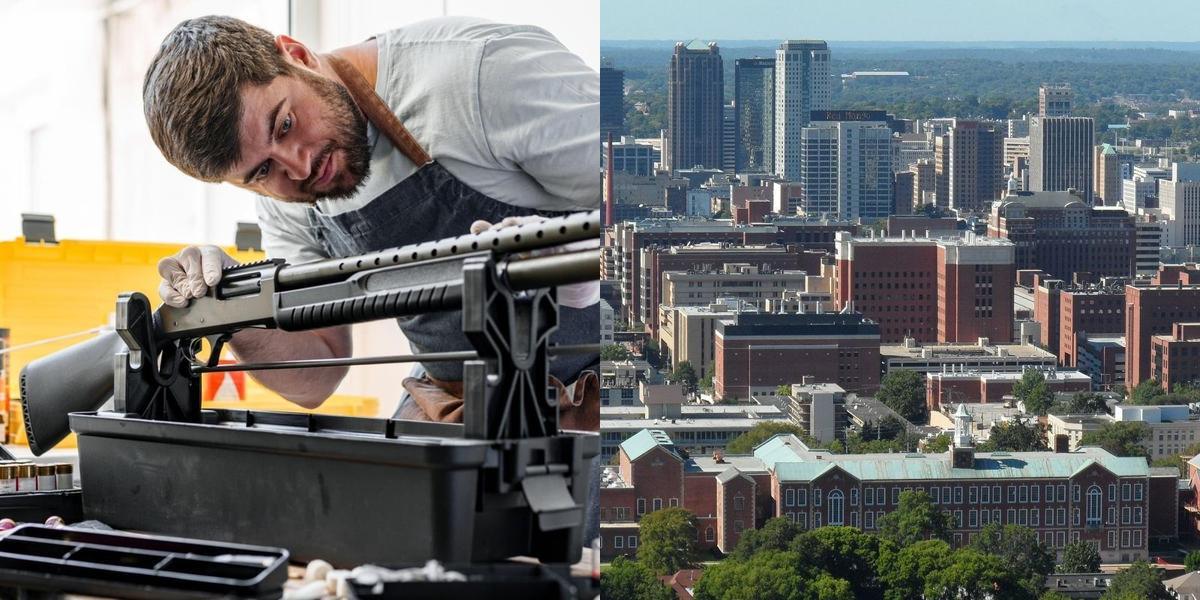How to Become a Gunsmith in Alabama

Becoming a gunsmith in Alabama requires a combination of specialized training and federal licensing. Gunsmiths are skilled craftspeople who repair, customize, build, and maintain firearms. While official state data is not available, industry estimates suggest the average salary for a gunsmith in Alabama is around $47,870 annually.
The path involves completing a formal training program, which is often online or out-of-state, and then successfully navigating the federal application process to obtain a Federal Firearms License (FFL).
Career Paths and Opportunities after Becoming a Gunsmith
A gunsmithing certification opens doors to several career paths within the firearms industry.
- Gunsmith at a Gun Shop: Many retail gun shops hire in-house gunsmiths to offer repair, maintenance, and customization services to customers.
- Firearms Manufacturer: Manufacturers employ gunsmiths for quality control, assembly, and research and development on production lines.
- Custom Gunsmith: This path involves specializing in high-end modifications, such as building custom rifles, creating unique finishes like Cerakote, or performing detailed engraving.
- Firearms Instructor: Your deep knowledge of firearm mechanics makes you an excellent candidate to become a certified firearms instructor, teaching safety and marksmanship.
- Entrepreneurship: Starting your own gunsmithing business offers the most freedom. A minimal workshop can be started for $10,000–$50,000, while a small retail and repair shop may require $50,000–$200,000 in initial capital.
For professional development, consider joining national organizations like the American Custom Gunmakers Guild (ACGG) or the National Shooting Sports Foundation (NSSF), as there are no dedicated gunsmith guilds in Alabama. Currently, there are also no active U.S. Department of Labor Registered Apprenticeship programs for gunsmiths in the state.
Frequently Asked Questions
What is the difference between a gunsmith and an armorer?
A gunsmith is a specialist who can design, build, and modify firearms from scratch. They possess a deep understanding of firearm mechanics and perform complex tasks to enhance performance or aesthetics. An armorer, by contrast, typically focuses on routine maintenance and swapping factory parts to keep firearms in standard working order.
Is gunsmithing a good trade?
Yes, gunsmithing is a stable trade. As long as firearms are owned and used, there will be a consistent demand for skilled professionals to repair, customize, and maintain them. This provides a reliable level of job security for those in the profession.
What are the working conditions for a gunsmith?
Most gunsmiths work in dedicated workshops, which may be part of a larger retail store or a standalone repair shop. The work involves using machinery that can be loud and chemicals that require a well-ventilated space for safety. Precision and a clean, organized environment are crucial.
Can a gunsmith fix a broken gun?
Absolutely. Diagnosing and fixing broken firearms is a core function of a gunsmith. From minor part replacements to major overhauls, a qualified gunsmith has the tools and expertise to restore a firearm to safe and efficient working condition.
Final Thoughts
Becoming a gunsmith in Alabama is a journey that combines a passion for firearms with technical skill and a commitment to the craft. The path requires completing a formal training program, securing a Federal Firearms License, and engaging in continuous learning to stay current with new technologies and techniques.
Whether you aim to work for a manufacturer, open your own custom shop, or provide essential repair services, the opportunities are there for dedicated individuals. By building a strong educational foundation and networking through professional organizations, you can establish a successful and fulfilling career.
Take the first step by exploring accredited gunsmithing programs near you and begin your journey in this skilled trade.
If you're considering a career shift or curious about different professional paths, Dreambound has written many guides to help you in making informed decisions. Here are a few:




